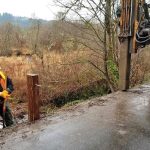Impacts of Cascadia Subduction Zone M9 Earthquakes on Bridges in Washington State: Three-Dimensional Bridge Models
|
The performance of bridges during large-magnitude earthquakes generated by the Cascadia Subduction Zone is an essential feature of the resilience of communities along the U.S. West Coast because bridges will be needed for pre-tsunami evacuation, emergency response, and economic recovery. This project developed a three-dimensional, nonlinear model of a typical bridge and subjected it to sets of simulated magnitude 9.0 earthquake ground motions to investigate the performance of bridges with a variety of structural characteristics. ... Read More about Impacts of Cascadia Subduction Zone M9 Earthquakes on Bridges in Washington State: Three-Dimensional Bridge Models | |










